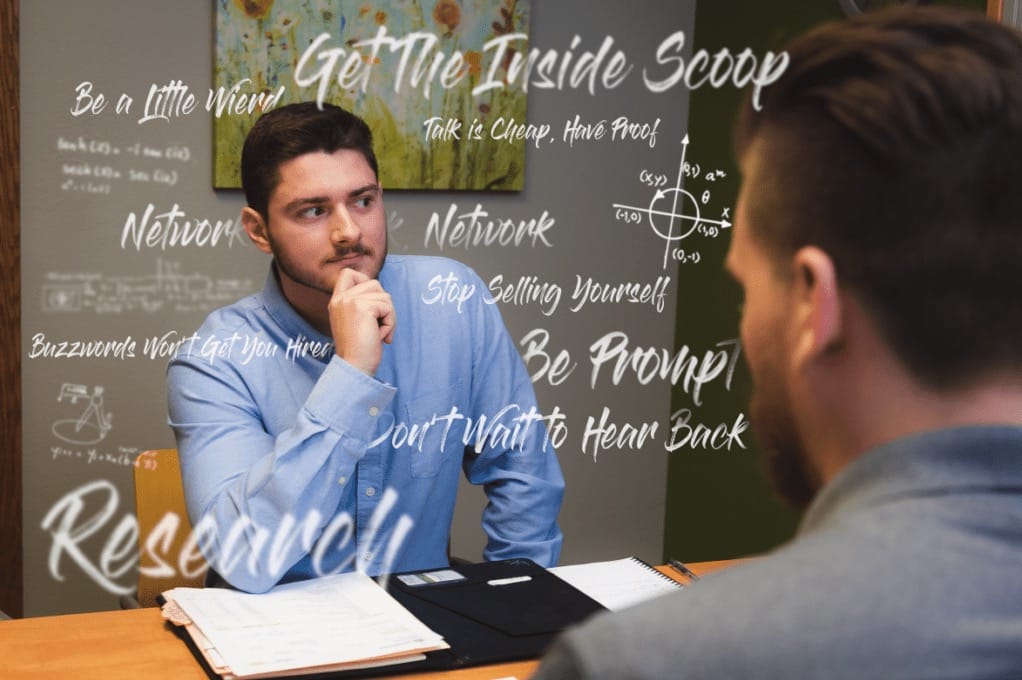I’m Don, RCP Marketing’s new Digital Marketing Coordinator. Having experienced both corporate and agency-side internships during college, I developed an appreciation for how much someone can learn in the fast-paced environment of an agency. During my last year of college I decided working within an agency was what I wanted- but looking back, I was naïve to how difficult the process would prove to be. Nine stressful months and many mistakes later, I realized how the proper strategy when beginning your agency job search makes all the difference. Here are my 10 best tips for navigating the post-grad agency job search.
Talk is Cheap, Have Proof
Everyone has different experience levels coming out of college, and if you didn’t have the luxury of a great internship, it’s not the end of the world. I’ve found that as valuable as internship experience is, what’s more valuable is proof that you’ve given as much thought to what you don’t know, and that you’re working to fill those gaps. Figure out an authentic way to show how quick you are to learn and pick up new skills you currently lack. This doesn’t mean crafting an elaborate interview speech explaining how motivated you are, it means staying current on industry trends, adding certifications to your resume, and developing a tangible portfolio that you can present (or discuss) during interviews. And beyond adding to your physical portfolio, having meaningful letters of reference and professional recommendations on your LinkedIn page goes a long way when speaking to your attributes as a great employee, teammate and person.
Resume Buzzwords Won’t Get You Hired, Be a Little Weird
I’m fairly certain I landed my first agency internship because of the Non-Essential Attributes section on my resume. I was a junior in college, and my understanding of the industry was minimal- but because this particular agency’s CEO loved grilled cheese (unbeknownst to me at the time), having “Grilled Cheese Master Chef” on my resume got me an interview. This isn’t a suggestion to lie about yourself to seem more interesting (I really do cook a mean grilled cheese), but don’t be afraid to throw some personality into your resume, it might just get you noticed.
Be Prompt, Don’t Wait to Hear Back
This one speaks for itself, but it’s one of the most important tips on this list. If you’re committing to the job hunt, stay committed every day. The first 6 months of mine were slow, but, if I’m being honest, I wasn’t being consistent or tenacious. More than once I had an interview lined up, but failed to continue applying for other positions until said opportunity didn’t pan out. For this period in your life, job sites like LinkedIn, Zip Recruiter and Monster.com should be your social media of choice. The more irons you have in the fire, the better chances you’ll land a job you really want. The reality is, agency jobs are highly sought after, and finding agency opportunities on job sites can often be rare. So, if you come across something, be quick to jump on that opportunity. Have an updated copy of your resume and portfolio ready to go- and if you have to, stay up an extra hour to craft a thoughtful cover letter. Remember, the early bird gets the worm.
Network, Network, Network
Take advantage of any networking opportunity you can. Go to as many events where industry professionals are speaking and learn what’s trending in the agency world. Let’s face it, our industry is cut throat; making even surface-level connections with local professionals can help you break that initial barrier of getting your foot in the door. And once you’ve met, make sure you follow up by inviting them to connect on LinkedIn. Doing this makes even the briefest interaction one that could be called upon during your next interview or professional opportunity. Furthermore, be as social as you can amongst your peers. Whether they’re looking, just starting at a new job, or have roots planted at an agency already, staying connected with your peers is an excellent way to get in on exclusive opportunities first.
Do Your Research
Ok, you landed an interview, it’s time to prepare. Start by crawling your interviewing company’s website. Check for team bio pages, learn about your interviewer if possible, and take an interest in the clients they manage. Being able to relate your skills and experience to projects an agency has worked on in the past shows that you’re not only able to make those connections, but that you’re interested in what they do. I haven’t been an industry professional for long, but I’m aware that this line of work can burn people out. The ones who seem to make it are those who dig in and are enthusiastic about the work they do. Show that same enthusiasm by doing your research.
Practice For Your Interviews, Anticipate Questions They Might Ask
Doing research on the agency that’s interviewing you is only half the battle. Being able to articulate your experience, as it relates to the position you’re interviewing for, is just as important as having the experience itself. During college, I was driven to add as many accolades to my resume and pieces to my portfolio as possible. The trouble I ran into early on was talking to each piece of experience with confidence. Make sure you review your resume before going into an interview and think on the projects you produced a while ago — you don’t want to fumble through an explanation if asked about it.
Get The Inside Scoop
Sometimes agency positions are open ended, sometimes they’re highly specialized. If given a phone interview or have the chance to ask the hiring agent some questions before you physically meet, ask about things like: day-to-day operations, the scope of work, what clients you’d be involved with and why the position is open in the first place. It’s important to dig a little deeper when you can, job postings are typically just a vague outline of things you might be involved with. Now having this information, instead of learning the specifics of the job during the interview, you’ll have that time to explain why you’re the right fit. Pre-interview insights will give you an advantage when you start reviewing and preparing.
Know Your $h!#, And When You Don’t, Don’t Pretend To
It is inevitable that even with significant preparation, you may not have all of the experience required for the position. Don’t pretend to know things you don’t know. Save yourself the embarrassment of being drilled on something you claim to have experience with when your knowledge is only surface level. You may be able to buzzword your way into the position this way, but the worst case scenario plays out with you getting hired then fired for being unable to do the job. And if the position is entry level, be aware that the agency is expecting to have to provide some initial guidance. Make yourself more appealing as a candidate by explaining what you don’t know and how you’re working towards that knowledge. Self-starters are invaluable within agencies; if you’re able to reduce amount of time invested in getting you up to speed, you’re already a stronger candidate than someone with more experience who needs their hand held.
It’s Okay To Get Personal, You Are a Person After All
Since being with RCP, I’ve learned the value of communication dynamics within an agency. We all talk to each other a LOT. So it’s fair to assume your agency interview will include questions about the kind of person you are, your interests, and your goals for the future. You’ve made it inside the agency doors and are in front of your potential co-workers, now is not the time to be robotic. Share a funny story that helped shape who you are, talk about some things you like to do in your free time, and show them that you’re someone they’d enjoy working with. This, by far, is where most people struggle (including myself). I entered many interviews having only studied up on what makes me a good candidate, not what makes me an interesting person. The dreaded, “Tell me about yourself” question is never easy, but its far less difficult having prepared for it.
Advertisers Are Perceptive, Stop Selling Yourself
Working in an industry like marketing and advertising is unlike anything I’ve ever experienced. Each day I have the opportunity to not only create, but to put pieces of myself into the work that I do. This field is so exciting to me, and by allowing myself to express that enthusiasm during my interview with RCP, I was able to find likeminded individuals as jazzed to work with me as I was to work with them. Having the mindset that you’re under a microscope and being judged in an interview setting will leave you guarded and overly agreeable. In my experience, “yes men/women” are seen a mile away and aren’t given a second look. Remember, advertisers & marketers are in the business of understanding people and analyzing behavior. The best in the industry have strong senses of empathy and know what it’s like when someone is selling to them. If you made it to the interview stage, your skills and experience have already sold themselves. Learn to be confident in your unique personality and do your best not to sell them a version of what you think they want. This buyer is already in market for what you can offer, show them the real you.


